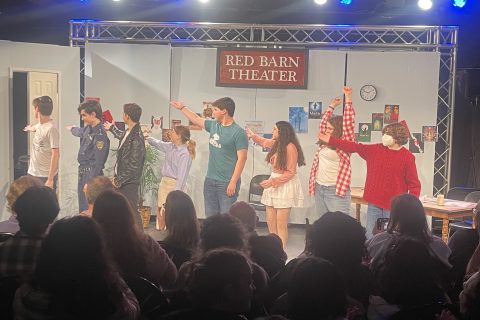By Adam Goldstein
Head of School Dr. Michael Kay delivered the third annual State-of-the-School address this evening, January 26th 2017, at the Upper School Campus. Kay discussed Schechter Westchester in its 51st year and his goals for the future.
Kay opened his address stating that Schechter Westchester strives to be a “wonder within a wonder.” In order for SW to reach its maximum potential as a Jewish Day School, it is not enough for SW to be just wonderful, but SW must be a “wonder within a wonder.”
“We operate under the assumption that we need to earn every family’s commitment, every single year. There are an awful lot of great school options out there, and it is our job to make sure that we’re going to ask you to opt out of all of those other places and invest your children here.”
Kay stated that he and the SW staff feel a real responsibility to meet people’s needs because of the tough choice that families make in order to send their children to SW. The tuition cost, distance to the school and the rigorous schedule can pose a challenge for many families.
However, Kay stated many reasons why it is worthwhile for all of the families who send their children to SW. Five “innovations that have emerged as a result of this synergy of a proactive vision and being responsive to feedback,” were discussed.
Kay’s first example of this synergy is the engineering education at SW, which has thrived under the leadership of Dr. Danny Aviv. Kay stated that the engineering program, “over the past few years has become one of our
signature programs.”
In the high school, the Engineering and Entrepreneurship program is a way that a Jewish Day School can accomplish having, “the best, the most creative, the most innovative and engaging engineering program in the country: one that is changing our students lives and will soon change our world.” Through the addition of a new, highly regarded computer science teacher as well as the new tech-style studio, the E2 program has continued to change and improve. Since the beginning of the program, 42% of students have been accepted into programs in engineering or computer science.
Not only is the E2 program one of the main strengths of SW, but the “customizability of the program, a program that is designed to meet the needs of students with different learning needs” is also helping shape SW.
The idea of tailoring to students’ specific learning needs has been applied in many other areas of the school as well. An Enriched Language Arts class in 6th grade, where students read and write twice as much as the other students in the grade, and self-paced online courses, are helping develop this type of curriculum.
The third example that Kay provided of an increased synergy at SW is
standardized testing. SW has adopted the CPT4 standardized test that is given to students in 3rd, 5th and 7th grade. According to Kay, the SW administration has been, “pretty pleased with the results of this.” Last year, the mean results for 7th grade exceeded national average, state average and suburban public school average. The same results matched or exceeded independent selective entry schools in: verbal reasoning, vocabulary, reading comprehension, writing mechanics, writing concepts and skills, quantitative reasoning and mathematics. Regarding these compared results, Kay stated, “we are exceptionally proud of that.”
Another change at SW is the evolution of philosophy in college counseling. This change is happening under the new leadership of college counseling; Kay said “earlier engagement with college counseling is available if you want it.” Kay stated that the new college counselors are open to speaking with any and every student, even if they are not in the 11th grade.
The final change Kay stated is bringing in outside eyes to review Hebrew education and make sure that the Hebrew language is being taught in the best way possible.
However, not only did Kay state in his address ways SW has already changed, but ways SW is planning on changing in the near future. He laid out three of the many plans SW has to further enhance the school experience.
The first aspect of SW that will be changed is the schedule, and the school administration has been working with the Independent School Management to accomplish this. Although the results of this partnership have not been finalized yet, Kay was able to reveal that conflicts with the language courses, the E2 course and the Center of Academic Support class will cease to exist. He also stated that the E2 program will continue to grow with more coding, more engineering and more building.
There will also be a new mindset at SW with more questioning, less formal learning spaces, more collaborating and more discovery, according to Kay. Robots that have created maps of the school and students who have rebuilt the Mishcan are just a glimpse into what is coming.
The final way Kay hopes SW can change is by increasing attendance at SW. “Thirty percent of the Jewish population in the United States, and therefore 13% of the Jews in the world live within a one hour drive of this spot. So from that I conclude, that there are probably a lot more people out there who can be benefitting from and falling in love with Schechter Westchester than currently are.” Kay stated that it is one of SW’s goals to attract new students through marketing and “other ways of getting the word out there.”
Jokingly, Kay said that “all” SW needs to do is be “a Jewish Day School that trains students to be menches, speak Hebrew, form a kehillah of children and adults that will last forever, speak intelligently about the Torah, be the leading advocates for Israel on campus, all the while ensuring that they have access to three maker-spaces, a math team that does very well in county competition, strong test scores relative to other independent schools, a state championship caliber athletic program, a prize winning chess team, seven theatrical productions every year, top-notch college placement, and other attractive programs. In other words, just be a top, independent school with a powerful, Jewish bent.”




